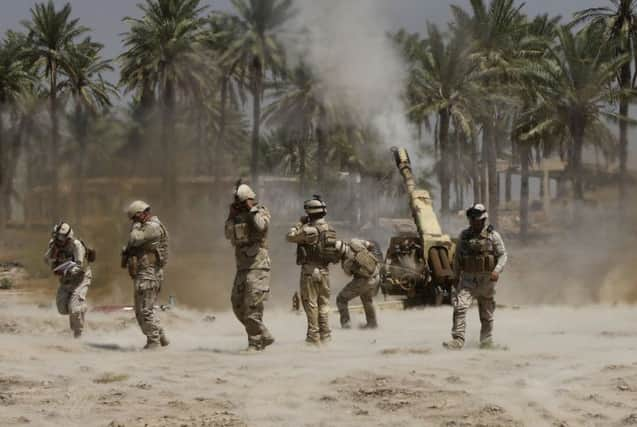Isis declares new Islamic state in Syria and Iraq


The Islamic State of Iraq and the Levant (Isis) announced not just its own state governed by sharia law but also claimed legitimacy as a successor to the first Islamic rule created by the Prophet Muhammad in the Arabian Peninsula 14 centuries ago.
The group proclaimed its leader, Abu Bakr al-Baghdadi, as caliph and demanded all Muslims around the world pledge allegiance to him.
Advertisement
Hide AdAdvertisement
Hide AdMeanwhile, Iraqi officials said last night at least nine people were wounded when three mortars landed near the gate of a Shiite shrine in Samarra.
The golden domed al-Askari mosque is one of the holiest shrines in Shiite Islam. Sunni militants blew up the dome in 2006, helping trigger some of the country’s worst sectarian bloodshed as Shiite extremists retaliated forcefully.
The move by Isis to declare a caliphate risks straining alliances with other Iraqi Sunnis who have helped the militants seize control of large parts of the Iraq’s north and west this month. Those Sunnis, including former officers in the military of ousted dictator Saddam Hussein, have backed the militants in hopes of bringing down the Shiite-led government, but do not necessarily share Isis’ ambitions to create a caliphate.
The extremist group – which said it was shortening its name to the Islamic State – has carved out a large chunk of territory that has effectively erased the border between Iraq and Syria.
Following the announcement of the caliphate, Isis fighters in their northern Syrian stronghold of Raqqa paraded through the city. Some of the revellers wore traditional robes and waved the group’s black flags in a central square.
Isis expelled rival rebel groups from Raqqa this spring, turning the city of 500,000 people on the banks of the Euphrates River into an image of the state it envisions. Activists from Raqqa have reported that music has been banned, Christians must pay an Islamic tax for protection, and violators of the strict interpretation of Islamic law are killed in the main square.
It is unclear whether Isis’s declaration heralds the imposition of the same rules elsewhere. So far, the group has taken a more moderate approach in cities under its control in Iraq, including Mosul and Tikrit, choosing to overlook some practices it considers forbidden. But the extremist faction was also more lenient in towns in Syria before eventually tightening its hold.
The announcement was greeted with condemnation and disdain elsewhere in Syria, including from rival rebel groups who have been fighting Isis.
Advertisement
Hide AdAdvertisement
Hide AdAbdel-Rahman al-Shami, a spokesman for the Islamist rebel group the Army of Islam, said: “The gangs of al-Baghdadi are living in a fantasy world. They’re delusional. They want to establish a state but they don’t have the elements for it. You cannot establish a state through looting, sabotage and bombing.”
Speaking from Ghouta, near the capital, Damascus, Mr Shami described the Isis declaration as “psychological warfare” that he predicted will turn people against the group.
In Iraq, where the government has launched a counter-offensive to try to claw back some of the territory it has lost, the declaration is viewed through the prism of the country’s rising sectarian tensions.
Hamid al-Mutlaq, a Sunni politician, said: “This is a project that was well-planned to rupture the society and to spread chaos and damage. This is not to the benefit of the Iraqi people, but instead it will increase the differences and splits.”
Isis has formed a loose alliance of sorts with other Sunni radicals and former members of Saddam’s Baath Party.
Aymenn al-Tamimi, an analyst who specialises in studying Islamic militants in Iraq and Syria, said: “Now the insurgents in Iraq have no excuse for working with Isis if they were hoping to share power with Isis. The prospect of infighting in Iraq is increased for sure.”